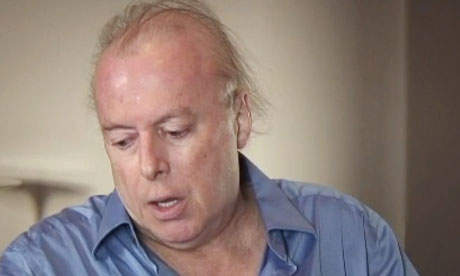Seriously internet. Get a grip.

Christopher Hitchens died today. He was a brilliant and acerbic polemicist who played pretty free and easy with exactly what historically orthodox, Bible based Christianity looks like in his most popular work God Is Not Good, but he was by all accounts a charming, debonair, raconteur type who meant what he said, and said what he thought, in a manner that belied his significant gifts. By all accounts, including his own, his battle with cancer was difficult, but he conducted himself with the poise, gravitas, and wit that endeared him to readers around the world.

But he was committed to remaining an atheist to the end. Committed to maintaining his rage against God (incidentally the title of the book his brother Peter wrote when explaining why he returned to faith). Now, Hitchens had plenty of Christian influence in his life – his brother, his travelling debate compadre Douglas Wilson, and Francis Collins, the head of the human genome project, and founder of Biologos, who took a personal interest in his treatment for the nasty cancer which ended his life too soon. Hitchens also clearly understood the gospel he was rejecting – his pointed criticisms of Christian liberalism make it clear that he knew what the Christian faith entailed. And that he rejected it deliberately, defiantly, and with some style and wit.
Here’s his definition of Christianity:
“I would say that if you don’t believe that Jesus of Nazareth was the Christ and Messiah, and that he rose again from the dead and by his sacrifice our sins are forgiven, you’re really not in any meaningful sense a Christian.”
He was in enough debates with enough Christians that he had a fair idea of what it was he was arguing against (even if he chose to misrepresent it for the sake of some polemical point scoring).
So why. Pray tell. Are we Christians so committed to articulating a hope that Hitchens magically renounced his skepticism at the very last? Certainly it is our hope. But should we not take the man at his word. His last words, incidentally, took the form of a requiem for the atheist dream, throwing down the gauntlet to challenge Nietzsche, one of the grandfathers of the modern atheist movement, and particularly his somewhat facile maxim that whatever doesn’t kill you makes you stronger. Hitchens was wrong to dismiss that saying – because the cancer killed him in the end. And the only thing that doesn’t kill a human, at least in the Biblical account of humanity, is faith in Christ, by which we have a much more hopeful outlook than either Hitchens or Nietzshe…
“Before I was diagnosed with esophageal cancer a year and a half ago, I rather jauntily told the readers of my memoirs that when faced with extinction I wanted to be fully conscious and awake, in order to “do” death in the active and not the passive sense. And I do, still, try to nurture that little flame of curiosity and defiance: willing to play out the string to the end and wishing to be spared nothing that properly belongs to a life span. However, one thing that grave illness does is to make you examine familiar principles and seemingly reliable sayings. And there’s one that I find I am not saying with quite the same conviction as I once used to: In particular, I have slightly stopped issuing the announcement that “Whatever doesn’t kill me makes me stronger.”
The Christian attempt to respond to the death of an interlocutor by extending grace to them, and naming them as potentially one of the saints, is nobly intended, but was odd when Steve Jobs died. And is downright insane when it comes to Hitchens. I’m not saying God couldn’t have come knocking on Hitchens’ door, but there is simply no indication that he changed his mind at the last (and he precluded such with a particularly pointed statement just months ago). Despite what Doug Wilson’s much lauded eulogy on Christianity Today might suggest. So while I hope Hitchens found the peace that faith in the resurrection of the Lord Jesus brings – I’m not going to chuck him a halo and a white robe just in case. But I’m not sure why the Christian blogosphere embraces the hagiographic eulogy in these times. The most gracious way to let an atheist go out is to let them go out acknowledging that they were defiant to the end (Matt Stone says something similar but with more brevity), that they, unlike many others – considered the questions of eternity, and their own mortality, and in the words of Hitchens, looked death in the face bravely (but stupidly), these were his last published words.
“So far, I have decided to take whatever my disease can throw at me, and to stay combative even while taking the measure of my inevitable decline. I repeat, this is no more than what a healthy person has to do in slower motion. It is our common fate. In either case, though, one can dispense with facile maxims that don’t live up to their apparent billing.”